一周一练3答案
- 格式:docx
- 大小:130.14 KB
- 文档页数:99
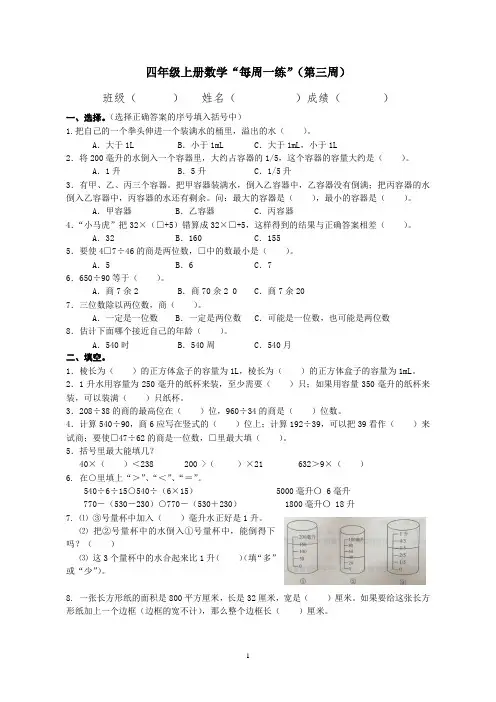
四年级上册数学“每周一练”(第三周)班级()姓名()成绩()一、选择。
(选择正确答案的序号填入括号中)1.把自己的一个拳头伸进一个装满水的桶里,溢出的水()。
A.大于1L B.小于1mL C.大于1mL,小于1L2.将200毫升的水倒入一个容器里,大约占容器的1/5,这个容器的容量大约是()。
A.1升 B.5升 C.1/5升3.有甲、乙、丙三个容器。
把甲容器装满水,倒入乙容器中,乙容器没有倒满;把丙容器的水倒入乙容器中,丙容器的水还有剩余。
问:最大的容器是(),最小的容器是()。
A.甲容器 B.乙容器 C.丙容器4.“小马虎”把32×(□+5)错算成32×□+5,这样得到的结果与正确答案相差()。
A.32 B.160 C.1555.要使4□7÷46的商是两位数,□中的数最小是()。
A.5 B.6 C.76.650÷90等于()。
A.商7余2 B.商70余2 0 C.商7余207.三位数除以两位数,商()。
A.一定是一位数 B.一定是两位数 C.可能是一位数,也可能是两位数8.估计下面哪个接近自己的年龄()。
A.540时 B.540周 C.540月二、填空。
1.棱长为()的正方体盒子的容量为1L,棱长为()的正方体盒子的容量为1mL。
2.1升水用容量为250毫升的纸杯来装,至少需要()只;如果用容量350毫升的纸杯来装,可以装满()只纸杯。
3.208÷38的商的最高位在()位,960÷34的商是()位数。
4.计算540÷90,商6应写在竖式的()位上;计算192÷39,可以把39看作()来试商;要使□47÷62的商是一位数,□里最大填()。
5.括号里最大能填几?40×()<238 200 >()×21 632>9×()6. 在○里填上“>”、“<”、“=”。
540÷6÷15○540÷(6×15) 5000毫升〇 6毫升770-(530-230)○770-(530+230) 1800毫升〇 18升7. ⑴③号量杯中加入()毫升水正好是1升。
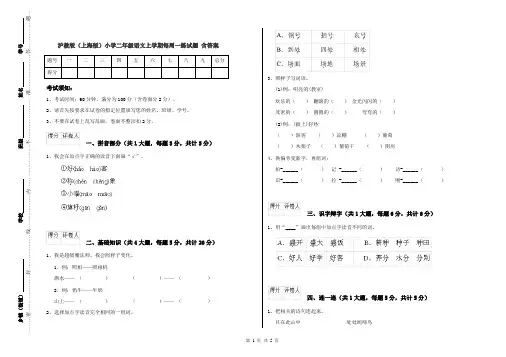
乡镇(街道) 学校 班级 姓名 学号 ………密……….…………封…………………线…………………内……..………………不……………………. 准…………………答…. …………题…沪教版(上海版)小学二年级语文上学期每周一练试题 含答案题号 一 二 三 四 五 六 七 八 九 总分 得分考试须知:1、考试时间:60分钟,满分为100分(含卷面分2分)。
2、请首先按要求在试卷的指定位置填写您的姓名、班级、学号。
3、不要在试卷上乱写乱画,卷面不整洁扣2分。
一、拼音部分(共1大题,每题5分,共计5分)1、我会在加点字正确的读音下面画“√”。
二、基础知识(共4大题,每题5分,共计20分)1、我是超级魔法师。
我会照样子变化。
1.例:照相——照相机洒水—— ( ) ( )—— ( ) 2.例:奶牛——牛奶山上—— ( ) ( )—— ( ) 2、选择加点字读音完全相同的一组词。
3、照样子写词语。
(1)例:明亮的(教室)欢乐的( ) 翻滚的( ) 金光闪闪的( ) 茂密的( ) 圆圆的( ) 弯弯的( ) (2)例:(披上)轻纱( )游客 ( )凉棚 ( )葡萄( )木架子 ( )葡萄干 ( )阴房 4、换偏旁变新字,再组词:拍-______( ) 记 -______( ) 访-______( ) 识-______( ) 拉 -______( ) 刚-______( )三、识字辩字(共1大题,每题6分,共计6分)1、用“____”画出每组中加点字读音不同的词。
四、连一连(共1大题,每题5分,共计5分)1、把相关的诗句连起来。
只在此山中 处处闻啼鸟随风潜入夜 下笔如有神 日出江花红胜火 润物细无声 春眠不觉晓 云深不知处 读书破万卷 春来江水绿如蓝五、完整句子(共1大题,每题6分,共计6分)1、按要求完成句子练习。
(1)连词成句:老师 这两个 是 马 居然 能 认出 怪物 _____________________________________________________ (2)加词扩句:她的头发粘在额头上。
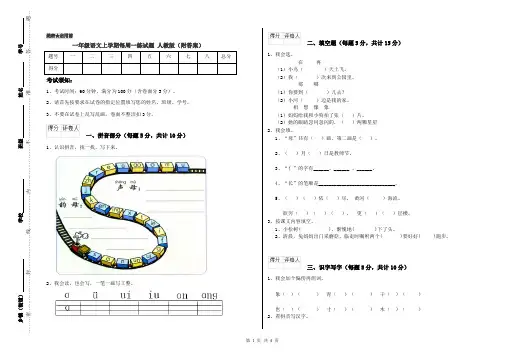
乡镇(街道)学校 班级 姓名 学号 ………密……….…………封…………………线…………………内……..………………不……………………. 准…………………答…. …………题…绝密★启用前一年级语文上学期每周一练试题 人教版(附答案)题号 一 二 三 四 五 六 七 八 总分 得分考试须知:1、考试时间:60分钟,满分为100分(含卷面分3分)。
2、请首先按要求在试卷的指定位置填写您的姓名、班级、学号。
3、不要在试卷上乱写乱画,卷面不整洁扣3分。
一、拼音部分(每题5分,共计10分)1、认识拼音,找一找,写下来。
2、我会读,也会写,一笔一画写工整。
二、填空题(每题5分,共计15分)1、我会选。
在 再(1)小鸟( )天上飞。
(2)我( )次来到公园里。
那 哪(1)你要到( )儿去? (2)小河( )边是我的家。
相 想 像 象(1)妈妈给我和小狗拍了张( )片。
(2)她的眼睛忽闪忽闪的,( )两颗星星 2、我会填。
1、“母”共有( )画,第二画是( )。
2、( )月( )日是教师节。
3、“亻”的字有______、______ 、______。
4、“长”的笔顺是______________________________。
5、( )( )依( )尽, 黄河( )海流。
欲穷( )( )( ), 更( )( )层楼。
3、按课文内容填空。
1、小松树( ),惭愧地( )下了头。
2、清晨,兔妈妈出门采蘑菇,临走时嘱咐两个( )要好好( )跑步。
三、识字写字(每题5分,共计10分)1、我会加个偏傍再组词。
象( )( ) 青( )( ) 干( )( )也( )( ) 寸( )( ) 木( )( ) 2、看拼音写汉字。
四、连一连(每题5分,共计10分)1、给反义词连线。
忙 非诚实 骄傲 是 哭 高兴 虚伪 笑 闲 虚心 伤心 2、连一连。
画五、补充句子(每题6分,共计12分)1、把下列句子补充完整。
1、__________________________,冬冬赶快跑回家。
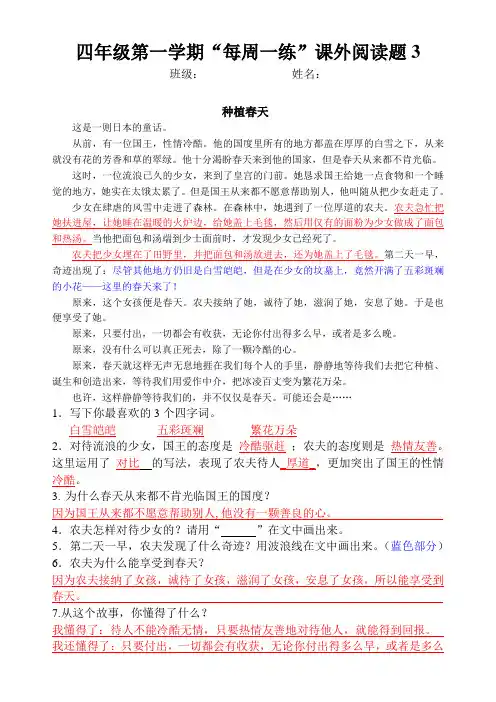
四年级第一学期“每周一练”课外阅读题3班级:姓名:种植春天这是一则日本的童话。
从前,有一位国王,性情冷酷。
他的国度里所有的地方都盖在厚厚的白雪之下,从来就没有花的芳香和草的翠绿。
他十分渴盼春天来到他的国家,但是春天从来都不肯光临。
这时,一位流浪已久的少女,来到了皇宫的门前。
她恳求国王给她一点食物和一个睡觉的地方,她实在太饿太累了。
但是国王从来都不愿意帮助别人,他叫随从把少女赶走了。
少女在肆虐的风雪中走进了森林。
在森林中,她遇到了一位厚道的农夫。
农夫急忙把她扶进屋,让她睡在温暖的火炉边,给她盖上毛毯,然后用仅有的面粉为少女做成了面包和热汤。
当他把面包和汤端到少士面前时,才发现少女已经死了。
农夫把少女埋在了田野里,并把面包和汤放进去,还为她盖上了毛毯。
第二天一早,奇迹出现了:尽管其他地方仍旧是白雪皑皑,但是在少女的坟墓上,竟然开满了五彩斑斓的小花——这里的春天来了!原来,这个女孩便是春天。
农夫接纳了她,诚待了她,滋润了她,安息了她。
于是也便享受了她。
原来,只要付出,一切都会有收获,无论你付出得多么早,或者是多么晚。
原来,没有什么可以真正死去,除了一颗冷酷的心。
原来,春天就这样无声无息地捱在我们每个人的手里,静静地等待我们去把它种植、诞生和创造出来,等待我们用爱作中介,把冰凌百丈变为繁花万朵。
也许,这样静静等待我们的,并不仅仅是春天。
可能还会是……1.写下你最喜欢的3个四字词。
白雪皑皑五彩斑斓繁花万朵2.对待流浪的少女,国王的态度是冷酷驱赶;农夫的态度则是热情友善。
这里运用了对比的写法,表现了农夫待人_厚道_,更加突出了国王的性情冷酷。
3.为什么春天从来都不肯光临国王的国度?因为国王从来都不愿意帮助别人,他没有一颗善良的心。
4.农夫怎样对待少女的?请用“”在文中画出来。
5.第二天一早,农夫发现了什么奇迹?用波浪线在文中画出来。
(蓝色部分)6.农夫为什么能享受到春天?因为农夫接纳了女孩,诚待了女孩,滋润了女孩,安息了女孩,所以能享受到春天。
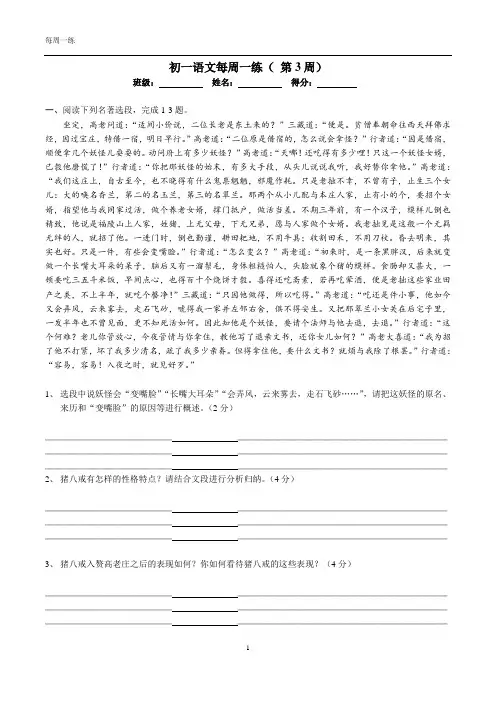
初一语文每周一练(第3周)班级:姓名:得分:一、阅读下列名著选段,完成1-3题。
坐定,高老问道:“适间小价说,二位长老是东土来的?”三藏道:“便是。
贫僧奉朝命往西天拜佛求经,因过宝庄,特借一宿,明日早行。
”高老道:“二位原是借宿的,怎么说会拿怪?”行者道:“因是借宿,顺便拿几个妖怪儿耍耍的。
动问府上有多少妖怪?”高老道:“天哪!还吃得有多少哩!只这一个妖怪女婿,已彀他磨慌了!”行者道:“你把那妖怪的始末,有多大手段,从头儿说说我听,我好替你拿他。
”高老道:“我们这庄上,自古至今,也不晓得有什么鬼祟魍魉,邪魔作耗。
只是老拙不幸,不曾有子,止生三个女儿:大的唤名香兰,第二的名玉兰,第三的名翠兰。
那两个从小儿配与本庄人家,止有小的个,要招个女婿,指望他与我同家过活,做个养老女婿,撑门抵户,做活当差。
不期三年前,有一个汉子,模样儿倒也精致,他说是福陵山上人家,姓猪,上无父母,下无兄弟,愿与人家做个女婿。
我老拙见是这般一个无羁无绊的人,就招了他。
一进门时,倒也勤谨,耕田耙地,不用牛具;收割田禾,不用刀杖。
昏去明来,其实也好。
只是一件,有些会变嘴脸。
”行者道:“怎么变么?”高老道:“初来时,是一条黑胖汉,后来就变做一个长嘴大耳朵的呆子,脑后又有一溜鬃毛,身体粗糙怕人,头脸就象个猪的模样。
食肠却又甚大,一顿要吃三五斗米饭,早间点心,也得百十个烧饼才彀。
喜得还吃斋素,若再吃荤酒,便是老拙这些家业田产之类,不上半年,就吃个罄净!”三藏道:“只因他做得,所以吃得。
”高老道:“吃还是件小事,他如今又会弄风,云来雾去,走石飞砂,唬得我一家并左邻右舍,俱不得安生。
又把那翠兰小女关在后宅子里,一发半年也不曾见面,更不知死活如何。
因此知他是个妖怪,要请个法师与他去退,去退。
”行者道:“这个何难?老儿你管放心,今夜管情与你拿住,教他写了退亲文书,还你女儿如何?”高老大喜道:“我为招了他不打紧,坏了我多少清名,疏了我多少亲眷。
但得拿住他,要什么文书?就烦与我除了根罢。
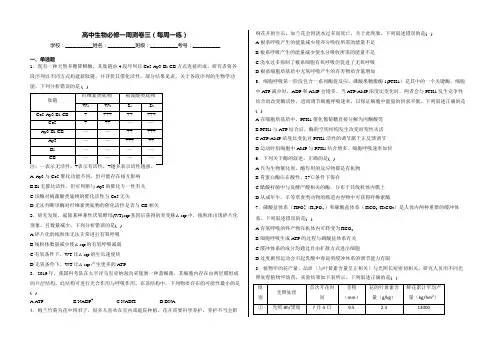
高中生物必修一周测卷三(每周一练)学校:___________姓名:___________班级:___________考号:___________一、单选题1.现有一种天然多糖降解酶,其肽链由4段序列以Ce5-Ay3-Bi-CB方式连接而成。
研究者将各段序列以不同方式构建新肽链,并评价其催化活性,部分结果见表。
关于各段序列的生物学功能,下列分析错误的是 ( )A. Ay3与Ce5 催化功能不同,但可能存在相互影响B.Bi无催化活性,但可判断与Ay3的催化专一性有关C.该酶对褐藻酸类底物的催化活性与Ce5无关D.无法判断该酶对纤维素类底物的催化活性是否与CB相关2.研究发现,敲除某种兼性厌氧酵母(WT)sqr基因后获得的突变株△sqr中,线粒体出现碎片化现象,且数量减少。
下列分析错误的是( )A.碎片化的线粒体无法正常进行有氧呼吸B.线粒体数量减少使△sqr的有氧呼吸减弱C.有氧条件下,WT 比△sqr的生长速度快D.无氧条件下,WT 比△sqr产生更多的ATP3.2019年,我国科考队在太平洋马里亚纳海沟采集到一种蓝细菌,其细胞内存在由两层膜组成的片层结构,此结构可进行光合作用与呼吸作用。
在该结构中,下列物质存在的可能性最小的是( )A.ATPB.NADP+C.NADHD.DNA4.梅兰竹菊为花中四君子,很多人喜欢在室内或庭院种植。
花卉需要科学养护,养护不当会影响花卉的生长,如兰花会因浇水过多而死亡,关于此现象,下列叙述错误的是( )A.根系呼吸产生的能量减少使养分吸收所需的能量不足B.根系呼吸产生的能量减少使水分吸收所需的能量不足C.浇水过多抑制了根系细胞有氧呼吸但促进了无氧呼吸D.根系细胞质基质中无氧呼吸产生的有害物质含量增加5.细胞呼吸第一阶段包含一系列酶促反应,磷酸果糖激酶1(PFK1)是其中的一个关键酶。
细胞中ATP减少时,ADP和AMP会增多。
当ATP/AMP浓度比变化时,两者会与PFK1发生竞争性结合而改变酶活性,进而调节细胞呼吸速率,以保证细胞中能量的供求平衡。
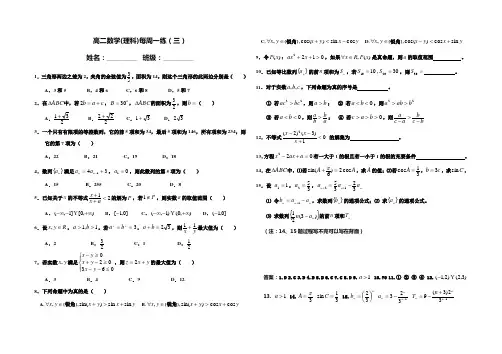
高二数学(理科)每周一练(三) 姓名:____________ 班级:____________1.三角形两边之差为2,夹角的余弦值为53,面积为14,则这个三角形的此两边分别是( )A .3和5B .4和6C .6和8D .5和72.在ABC ∆中,若c a b +=2, 30=B ,ABC ∆的面积为23,则=b ( )A .231+B .222+C .31+D .323.一个只有有限项的等差数列,它的前5项和为34,最后5项和为146,所有项和为234,则它的第7项为( )A .22B .21C .19D .184.数列{}n a 满足341+=-n n a a ,01=a ,则此数列的第5项为( )A .15B .255C .20D .85.已知关于x 的不等式21<++ax x 的解为P ,若P ∉1,则实数a 的取值范围( )A .),0[]1,(+∞--∞B .]0,1[-C .),0()1,(+∞--∞D .]0,1(-6.设R y x ∈,,1,1>>b a ,若3==yx b a ,32=+b a ,则yx11+最大值为( )A .2B .23C .1D .217.若实数y x ,满足⎪⎩⎪⎨⎧≤--≥-+≥-063020y x y x y x ,则y x z +=2的最大值为( )A .3B .4C .9D .12 8.下列命题中为真的是( )A.∈∀y x ,{锐角},y x y x sin sin )sin(+>+B.∈∀y x ,{锐角},y x y x cos cos )sin(+>+C.∈∀y x ,{锐角},y x y x cos sin )cos(-<+D.∈∀y x ,{锐角},y x y x sin cos )cos(+<-9.令)(x P :0122>++x ax ,如果)(,x P R x ∈∀是真命题,则a 的取值范围 。
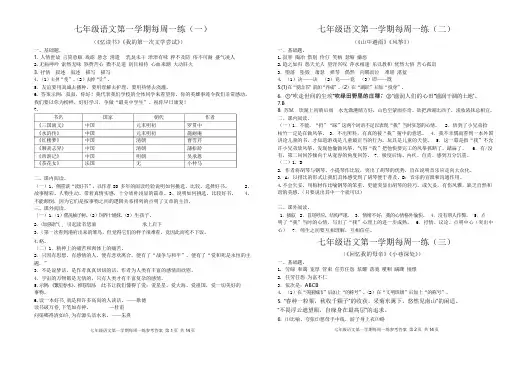
” ” ”七年级语文第一学期每周一练(一)(《忆读书》《我的第一次文学尝试》)一、基础题。
1. 人情世故 言简意赅 戏谑 悬念 消遣 乳臭未干 津津有味 猝不及防 俗不可耐 盛气凌人2.无病呻吟 索然无味 煞费苦心 微不足道 刮目相待 心血来潮 大动肝火3. 抒情 叙述 叙述 描写 描写4.(1)去掉“使”。
(2)去掉“让”。
5. 友谊要用真诚去播种,要用理解去护理,要用热情去浇灌。
6. 答案示例:叔叔,你好!我代表我们学校的全体同学来看望你。
你的英雄事迹令我们非常感动。
我们要以你为榜样,好好学习,争做“最美中学生”。
祝你早日康复!7.书名国家朝代作者《三国演义》中国 元末明初 罗贯中 《水浒传》 中国 元末明初 施耐庵 《红楼梦》 中国 清朝 曹雪芹 《聊斋志异》 中国 清朝 蒲松龄 《西游记》 中国 明朝 吴承恩 《茶花女》法国无小仲马二、课内阅读。
(一)1、侧重谈“读好书”,以作者 80 多年的阅读经验说明如何挑选、比较、选择好书。
2、故事精彩、人物生动、带着真情实感,十分质朴浅显的篇章。
3、说明如何挑选、比较好书。
4、不能颠倒,因为它们是按事物之间的逻辑关系排列的点明了文章的主旨。
三、课外阅读。
(一)1.(1)偶见柚子树。
(2)饲养十姐妹。
(3)生孩子。
2.(加强语气 , 引起读者思索 承上启下3.(第一次看到港府出来的雏鸟,但觉得它们的样子很难看,竟因此而吃不下饭。
4.略。
(二)1.精神上的痛苦和肉体上的痛苦。
2.只因有思想、有感情的人,便有悲欢离合,便有了“战争与和平”,便有了“爱和死是永恒的主 题。
”3.不是说梦话,是作者真真切切的话,作者为人类有丰富的感情而欣慰。
4.宇宙的万物都是无情的,只有人类才有丰富复杂的感情。
5.示例:《繁星春水》,推荐原因: 此书让我们懂得了爱:爱星星、爱大海、爱祖国,爱一切美好的 事物。
6.读一本好书,就是和许多高尚的人谈话。
——歌德 读书破万卷,下笔如有神。
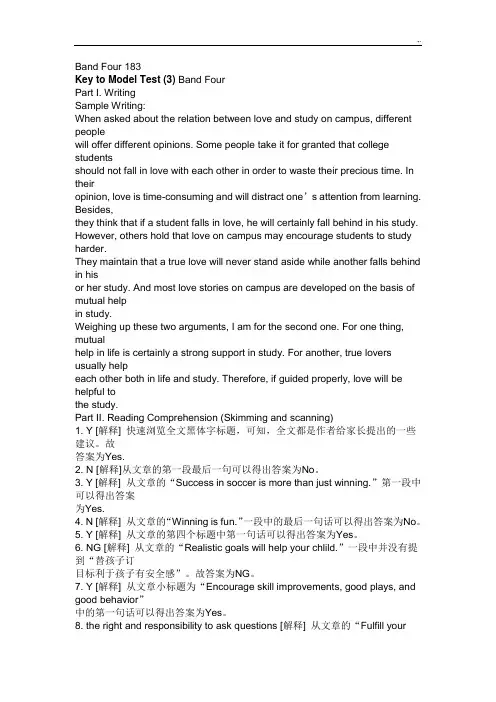
Band Four 183Key to Model Test (3) Band FourPart I. WritingSample Writing:When asked about the relation between love and study on campus, different peoplewill offer different opinions. Some people take it for granted that college studentsshould not fall in love with each other in order to waste their precious time. In theiropinion, love is time-consuming and will distract one’s attention from learning. Besides,they think that if a student falls in love, he will certainly fall behind in his study. However, others hold that love on campus may encourage students to study harder.They maintain that a true love will never stand aside while another falls behind in hisor her study. And most love stories on campus are developed on the basis of mutual helpin study.Weighing up these two arguments, I am for the second one. For one thing, mutualhelp in life is certainly a strong support in study. For another, true lovers usually helpeach other both in life and study. Therefore, if guided properly, love will be helpful tothe study.Part II. Reading Comprehension (Skimming and scanning)1. Y [解释] 快速浏览全文黑体字标题,可知,全文都是作者给家长提出的一些建议。
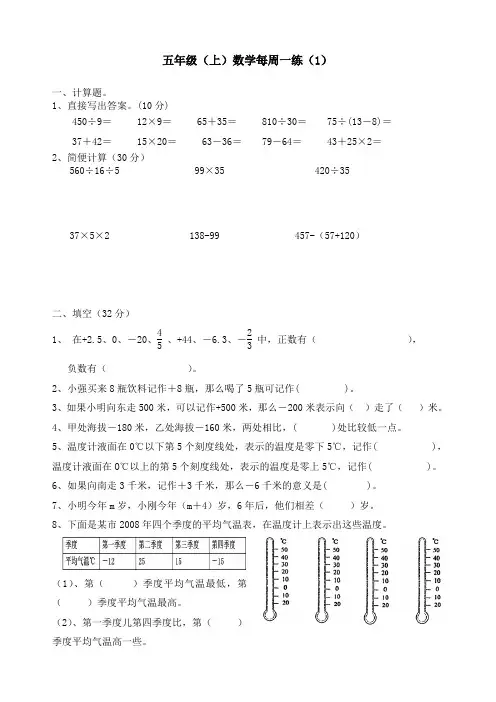
五年级(上)数学每周一练(1)一、计算题。
1、直接写出答案。
(10分)450÷9= 12×9= 65+35= 810÷30= 75÷(13-8)=37+42= 15×20= 63-36= 79-64= 43+25×2=2、简便计算(30分)560÷16÷5 99×35 420÷35 37×5×2 138-99 457-(57+120)二、填空(32分)1、在+2.5、0、-20、45、+44、-6.3、-23中,正数有(),负数有()。
2、小强买来8瓶饮料记作+8瓶,那么喝了5瓶可记作( )。
3、如果小明向东走500米,可以记作+500米,那么-200米表示向()走了()米。
4、甲处海拔-180米,乙处海拔-160米,两处相比,( )处比较低一点。
5、温度计液面在0℃以下第5个刻度线处,表示的温度是零下5℃,记作( ),温度计液面在O℃以上的第5个刻度线处,表示的温度是零上5℃,记作( )。
6、如果向南走3千米,记作+3千米,那么-6千米的意义是( )。
7、小明今年m岁,小刚今年(m+4)岁,6年后,他们相差()岁。
8、下面是某市2008年四个季度的平均气温表,在温度计上表示出这些温度。
(1)、第()季度平均气温最低,第()季度平均气温最高。
(2)、第一季度儿第四季度比,第()季度平均气温高一些。
9、潜水艇在水下30米处记作—30米,如果上浮5米,这时他的位置可记作()米。
10、一瓶饮料的外包装上标有“净含量500克+5克”。
这瓶饮料最多不多于()克,最少不少于()克。
三、解决问题(28分)1、小军和爸爸沿湖边的小路跑步晨练,他们从同一地点出发,反向而行,8分钟后相遇。
如果爸爸每秒跑6米,小军每秒跑4米,这条小路长多少米?(7分)2、李奶奶家去年种植了一块边长是20米的正方形蔬菜地,为了增加收入,今年她把这块正方形蔬菜地的边长都增加了5米。
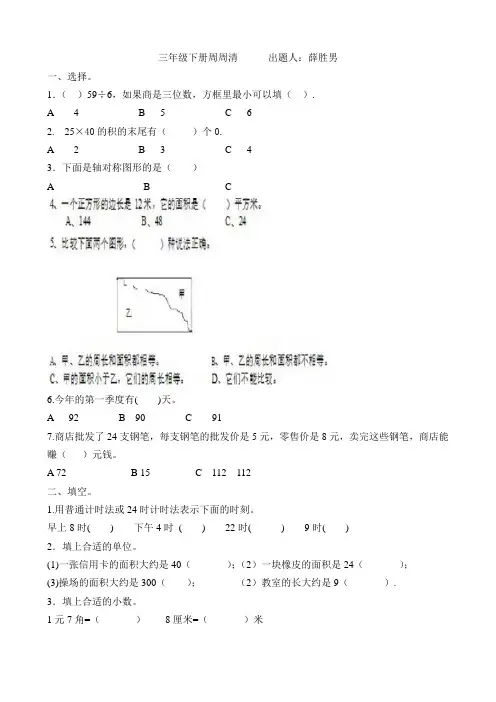
三年级下册周周清出题人:薛胜男一、选择。
1.()59÷6,如果商是三位数,方框里最小可以填().A 4B 5C 62. 25×40的积的末尾有()个0.A 2B 3C 43.下面是轴对称图形的是()A B C6.今年的第一季度有( )天。
A 92B 90C 917.商店批发了24支钢笔,每支钢笔的批发价是5元,零售价是8元,卖完这些钢笔,商店能赚()元钱。
A 72B 15C 112 112二、填空。
1.用普通计时法或24时计时法表示下面的时刻。
早上8时( ) 下午4时( ) 22时( ) 9时( )2.填上合适的单位。
(1)一张信用卡的面积大约是40();(2)一块橡皮的面积是24();(3)操场的面积大约是300();(2)教室的长大约是9().3.填上合适的小数。
1元7角=()8厘米=()米4.中华人民共和国是1949年10月1日成立的,到今年的10月1日我国成立()周年。
5.学校要把650本书捐给希望工程,每5本打一包,需要打多少包?这个题目列算式为(),为什么用这种方法?( )。
6.一个工人每天修105米的山路,8天能修多少米山路?列式为(),为什么用这种方法?()。
你发现了什么?()8.612÷2的商的十位上是()为什么?()。
9.()38÷6,如果商是两位数,方框里最大可以填()。
10. 3 2×1 26 4 ……()×()的积3 2 ……()×()的积3 8 411、一个长方形长24厘米,宽18厘米,从上面剪下一个最大的正方形,这个正方形的面积是(),剩余图形的周长是()。
12、今年暑假从7月1日开始,9月5日开学,暑假一共()天。
13、一辆火车每小时行驶125千米,早上8:00从青岛出发,下午4时才到济南,从青岛到济南一共有()千米。
14、2015年6月18日星期四,7月3日是星期()。
15、一根铁丝长144厘米围成了一个长方形,它的长是36厘米,宽是()面积是( ).三、拓展应用。
省(市区) 姓名 准考证号 ………密……….…………封…………………线…………………内……..………………不……………………. 准…………………答…. …………题…2021硕士研究生入学考试《教育学》每周一练试卷 附答案 考试须知:1、考试时间:180分钟,本卷满分为300分。
2、请首先按要求在试卷的指定位置填写您的姓名、准考证号等信息。
3、请仔细阅读各种题目的回答要求,在密封线内答题,否则不予评分。
一、单项选择题(共45小题,每题2分,共90分)1、在学习过程中,通过自我监控、自我调节等方式来促进学习的策略是( )A.元认知策略B.资源管理策略C.精细加工策略D.组织策略2、中国近代早期教会学校中开设儒学经典课程是为了( )A.满足在校士大夫子弟的要求B.执行中国政府的相关文教政策C.提高学生对儒家学说的批判能力D.便于学生在中国文化环境中立足3、在中国教育史上,提出对知识要坚持“效验”“有证”、对师长要敢于质疑问难的教育家是( )A.墨翟B.孟轲C.王充D.韩愈4、17-18世纪英国的公学采用寄宿制,以升学为主要目标,具有大学预科的性质。
这种“公学”的含义是( )A.公立学校B.公共机构管理的学校C.由政府或地方使用公共税收开办的学校D.为培养公职人员而由公众团体资助兴办的学校5、夸美纽斯1632年发表的《大教学论》,是教育学形成过程中一个重要的里程碑。
但此书尚不足以标志教育学作为一门学科的诞生,原因是此书( )A.宣扬教育为现世生活作准备B.只谈教育实务,不谈教育理论C.并非教育理论著作,而是教学理论著作D.以自然类比教育,理论论证尚未达到学科成熟的水平6、1862年,美国林肯总统批准了《莫雷尔法》,要求各州开办或资助农业和机械工艺类学院。
这类学院被称为( )A.初级学院B.社区学院C.赠地学院D.技术学院7、0世纪60年代确立法国高等教育发展的民主自治,多学科原则规定大学是享有教学、行政和财政主权的国家机构的教育法案是( )A.《福尔法案》B.《哈比改革》C.《阿斯蒂埃法案》D.《郎之万一瓦隆教育改革方案》8、20世纪30年代初期,梁漱溟在山东邹平、菏泽两县设立乡农学校,开展乡村教育试验。
青岛版六年级下册数学周周清作业
一、解方程。
(18分)
60%X-35%X = 125 X-40%X = 120
二、解决问题。
1、一个电饭煲的原价220元,现价160元。
电饭煲的价格降低了百分之几?(百分号前保
留一位小数)
2、有一列火车,原来每小时行驶80千米,提速后,这列火车的速度比原来增加了40%。
现在这列火车每小时行驶多少千米?
3、修一条高速公路,甲队修了全长的60%,乙队修了全长的30%,甲队比乙队多修27千米。
这条公路全长多少千米?
4、李老师把2000元钱存入银行,整存整取五年,年利率是4.14%。
到期时,李老师一共能取回多少钱?(利息税是5%)
5、西乡今年荔枝大丰收,产量达到3.6万吨,比去年增产了二成,西乡去年荔枝的产量是多少万吨?
6、儿童游乐场的门票原来每张30元,“春节”期间八折优惠,刘老师一家3口去游乐场玩,购买门票一共能省多少元?
7、一台电视机现售价6000元,盈利20%,这台电视机的进货价是多少元?
8、一辆汽车运一堆货物,运走了总数的35%,这时剩下的比运走的还多18吨。
原来这堆货物有多少吨?
9、用汽车运一批水果,第一天运的吨数与总重量的比是1:3。
如果再运15吨,就可以运完这批水果的一半。
这批水果共有多少吨?。
一、填空15吨=( )千克( )千克=3000克2000克=( )千克二、填上适当的质量单位一个西瓜重4000( )一根火腿肠40( )一头黄牛重500( )一袋盐重1( )一瓶矿泉水重600( )汽车的速度每小时80( )大象的体重8000( )一袋大米重25( )一辆卡车的载重量是6( )三、 比一比7吨○7900千克 2000克○1吨600千克○6吨 19克○1千克 1千克○100克+900克 四、按一定的顺序排列。
(1)4千克 3900千克 4500克 (2) 3030克1千克 1 吨 990克五、选择:1)18个鸡蛋大约重1( )A 、克B 、米C 、千克2)1千克沙子的质量( )1000克棉花的质量。
A 、 >B 、 <C 、 =3)买1千克香蕉需要3元钱,现在有15元钱,能买( )千克香蕉。
A 、 5000B 、5C 、 500六、判断对错1)两个完全相同的箱子,一个装满了棉花,一个装满了铜丝,它们一样重。
( )2)5千克的铁比5千克棉花重。
( )有一桶油连桶称重15千克,油桶重1千克,用去一半油后还剩几斤油?青岛版三年级上册周周清作业(第一周)班级: 姓名: 等级:易错题一、口算。
(带*的题目写出算理)3×9= 20×4= 50×6= 30×2= 21×4= 34×2= 33×3= 9×10= 43×2=* 40×6= 想:*29×2=竖式计算积的十位上为什么是5?二、竖式计算。
33×2= 3× 45=84×5 = 81×6=三、实际应用。
(根据信息提出问题并解答).自行车每小时可以行24千米,小轿车的速度是自行车的3倍, 。
1.明明家住五楼,他从一楼到二楼要走18级台阶,各楼间台阶一样多,请问明明回家要走多少级台阶?2.他每天来回3次,一共要走多少级台阶?青岛版三年级上册周周清作业(第二周)班级: 姓名: 等级: 易错题1.计算40×3=?时,我是这样想的:( )个( )乘( ),得( )个( ),就是( )。
Listening Scripts (4)Part III. Listening ComprehensionSection A:Directions: In this section, you will hear 8 short conversations and 2 long conversations.. At the end of each conversation, one or more questions will be asked about what was said. Both the conversations and the questions will be spoken only once. After each question there will be a pause. During the pause, you must read the four choices marked A), B), C) and D), and decide which is the best answer. Then write the corresponding letter on Answer Sheet 2.11. M: Would you like a copy of Professor Smith’s article?W: Thanks, if it’s not too much trouble.Q: What does the woman imply?12. W: Did you visit the Television Tower when you had your vacation in Shanghailast summer?M: I c ouldn’t make it last June. But I finally visited it two months later. I plan to visit it again sometime next year.Q: What do we learn about the man?13. M: Prof. Kennedy has been very busy this semester. As far as I know, he worksuntil mid-night every day.W: I wouldn’t have troubled him so much if I had known he was so busy.Q: What do we learn from the conversation?14. W: If I were you, I would have accepted the job.M: I turned down the offer because it would mean frequent business trips away from my family:Q: Why didn’t the man accept the job?15. M: How are you gett ing on with your essay, Mary? I’m having a real hard timewith mine.W: After two sleepless nights, I’m finally through with it.Q: What do we learn from this conversation?16. M: Wouldn’t you get bored with the same routine year after year teaching thesame things to children?W: I don’t think it would be as boring as working in an office. Teaching is more stimulating.Q: What does the woman imply about office work?17. W: Oh, it’s so cold. We haven’t had such a severe winter for so long, have we?M: Yes, the forecast says it’s going to get worse before it warms up.Q: What do we learn from the conversation?18. M: You were seen hanging about the store on the night when it was robbed, weren’t you?W: Me? You must have made a mistake. I was at home that night.Q: What are they talking about?Now you will hear two long conversations.Conversation 1M: I understand you’d like to go for further study.W: Yes, Professor Smith. I’d like to very much. Could you tell me where I might get some information about colleges and universities?M: Yes, the Internet should have some catalogs.W: Thank you.M: It’s my pleasure. Of course, you can also write d irectly to any university for its catalogue.W: Could you write a letter of recommendation for me? I am applying for admission to the University of California for postgraduate studies.M: Ah, that’s a good university. Sure, I’d be happy to write you one.W: Thank you very much. When can I pick it up?M: You don’t have to. American universities prefer to have a letter of recommendation sent directly from the people who write them. Just leave me some information about where you want it sent, and I’ll have it in the mail by tomorrow afternoon.Questions 19 to 22 are based on the conversation you have just heard.19.What’s the relationship between the two speakers?20.Where can he get the information about colleges and universities?21.What does the woman ask the man to do?22.When does the man send the letter?Conversation 2W: Hello, this is Dr. Green’s office. May I help you?M: I’d like to make an appointment to see the doctor.W: Well, what’s wrong with you?M: I’ve had severe pains in my throat.W: What time do you think is convenient?M: I really am in pain so I would like an appointment as soon as possible.W: What about tomorrow morning?M: Yes, that would be fine.W: Is 9:30 okay?M: Okay.W: I need some information for your record. Could you please give me your full name, address, phone number and insurance coverage?M: Sure.Questions 23 to 25 are based on the conversation you have just heard.23.What is the probable relationship between the two speakers?24.Where is the man’s pain?25.What is the man going to do?Section B:Directions: In this section, you will hear 3 short passages. At the end of each passage, you will hear some questions. Both the passage and the questions will be spoken only once. After you hear a question, you must choose the best answer from the four choices marked A), B),C),and D). Then write the corresponding letter on the Answer Sheet 2.Passage OneThere are three groups of English learners: beginners, intermediate learners, and learners of special English. Beginners need to learn the basics of English. Students who have reached an intermediate level benefit from learning general English skills. But what about student who want to learn specialist English for their work or professional life? Most students, who fit into this third group have a clear idea about what they want to learn. A bank clerk, for example, wants to use this specialist vocabulary and technical terms of finance. But for teachers, deciding how to teach specialist English is not always so easy. For a start, the variety is enormous. Every field from airline pilots to secretaries has its own vocabulary and technical terms. Teachers also need to have an up-to-date knowledge of that specialist language, and not many teachers are exposed to working environments outside the classroom. These issues have influenced the way specialist English is taught in schools. This type of course is usually known as English for Specific Purposes, or ESP and there aren't ESP courses for almost every area of professional and working life. In Britain, for example,there are courses, which teach English for doctors, lawyers, reporters, travel agents and people working in the hotel industry. By far, the most popular ESP courses are for business English.Questions 26 to 28 are based on the passage you have just heard.26. What is the characteristic of learners of special English?27. Who needs ESP courses most?28. What are the most popular ESP courses in Britain?Passage TwoSports and games are very useful for character-training. In their lessons, boys and girls may learn about such virtues as unselfishness, courage, discipline and love of one’s country. But what is learned in books cannot have the same deep effect on a child as wh at is learned by experience. As most of the pupils’ time is spent in classes studying lessons, the ordinary school can't give much practical training for their lives in the future. So it is what the pupils do in the spare time that really prepares them to take their places in society as citizens when they grow up. If each of them learns to go all out for his team and not for himself on the football field, he will later find it natural to work for the good of his country instead of only for his own benefit.Questions 29 to 31 are based on the passage you have just heard.29. What is the speaker's opinion about learning from books?30. Why isn't ordinary day school able to give pupils much training for their future lives?31. What can help to develop a child's love of his country according to the speaker?Passage ThreeAs the car industry develops, traffic accidents have become as familiar as the common cold. Yet their cause and control remain a serious problem that is difficult to solve.Experts have long recognized that this discouraging problem has multiple causes. At the very least it is a problem that involves three factors: the driver, the vehicle and the roadway. If all drivers exercised good judgment at all times, there would be few accidents. But this is rather like saying that if all people were honest, there would be no crime. Improved design has helped to make highways much safer. But the toll ofaccidents continues to rise because of human failure and an enormous increase in the number of automobiles on the road. Attention is now turning increasingly to the third factor of the accident: the car itself. Since people assume that the accidents are bound to occur, they want to know how cars can be built better to protect the drivers.Questions 32 to 35 are based on the passage you have just heard.32. What does the speaker think are the causes of automobile accidents?33. What measure has been taken to reduce car accidents?34. What remains an important factor for the rising number of road accidents?35. What's the focus of people’ attention today according to the passage?Section C: Spot DictationDirections: In this section, you will hear a passage three times, when the passage is read for the first time, you should listen carefully for its general idea. When the passage is read for the second time, you are required to fill in the blanks numbered from 36 to 43 with the exact words you have just heard. For blank numbered from 44 to 46 you are required to fill in the missing information. For these blanks, you can either use the exact words you have just heard or write down the main points in your own words. Finally, when the passage is read for the third time, you should check what you have written.The (36) origin of language is a mystery. All we really know is that men, (37) unlike animals, somehow invented certain sounds to express thoughts and feelings, actions and things, so that they could (38)communicate with each other; and that later they agreed upon certain (39) signs, called letters, which could be combined to (40 )represent those sounds and which could be written down. Those sounds, whether spoken, or written in letters, we call words.The (41) power of words, then, lies in their (42) associations--the things they bring up before our minds. Words become (43) filled with meaning for us by experience; and the longer we live, (44) the more certain words recall to us the glad and sad events of our past; and the more we read and learn, the more the number of words that mean something to us increases.Great writers are those who not only have great thoughts (45) but also express these thoughts in words which appeal powerfully to our minds and emotions. This charming and telling use of words is what we call literary style. Above all, the real poet is a master of words. (46) He can convey his meaning in words which sing like music, and which can move men to tears by their position and association. We should, therefore, learn to choose our words carefully and use them accurately, or they will make ourspeech silly and vulgar.。
Key to Model Test (1) Band ThreePart I. WritingSample Writing:On Lifelong LearningWith the rapid development of modern society, lifelong learning has been increas-ingly important. People need to improve themselves all the time by learning in order to adapt to t he fast changes and fierce competition in the society. They have to learn about the latest develop ment and techniques to equip themselves.We can achieve lifelong education in several ways. First, you can choose distant education. Most f amous universities have set up their own distant education college to help people realize their dr eams. Secondly, there are various kinds of training courses and night courses. People can take adv antage of their spare time to learn what they are interested in, such as English, computer skills an d drawing. In addition, people can study all by themselves. They can read books in a library or a b ookstore in their free time.I prefer to distant education provided by some universities. As is known, colleges have excellent f aculty, modern teaching facilities and strong learning atmosphere. By distant education courses, we can enjoy these resources, learning more knowledge and making bigger and quicker progress.Part II. Reading Comprehension (Skimming and Scanning)1. Y. 从文中的第一段第二,三句可以了解到尼古丁的这些特性,从而判断出这一说法是正确的。
2. N. 从文中第二段第二,三句可以判断出题中给出的数字是错误的。
3. N. 从文中第三段第一,五句可以了解到尼古丁对人的身体是有利也有害的,因而题中的说法是错误的。
4. Y. 与文中第四段第二句内容相符,因而正确。
5. N. 与文中第五段第二句意思恰恰相反,因而错误。
6. N. 从文中第五段第九句了解到口中的皮肤可以直接吸收一部分的尼古丁,剩余的尼古丁则会进入肺部,扩散到血管中,通过血管进入心脏,然后到达大脑。
7. N. 与文中第五段倒数第三句的意思恰恰相反,因而错误。
8. 10 seconds. 文中第五段倒数第二句可以找到答案。
9. the release of chemicals associated with pleasure. 文中第六段第二句可以找到答案。
10. dependent on the nicotine. 文中最后一段最后一句可以找到答案。
Band Three155Part III. Listening ComprehensionSection A11. D. 本题男士的回答是关键, the last person I want to see, 表明他最不想见到Johnson,他不愿意陪同他去长城。
12. D. 女士在回答时说but I have to finish washing my clothes, 表明她不能去看电影。
转折后的句子是解题的关键。
13. C. 本题猜测说话人的关系,关键词是 article, shelf, newspaper, 此外,还要根据说话人的口气,对选项进行排除才能确定。
14. B. 本题第二人的回答是关键,change the shoes, 表明了对话发生的地点是在商店。
15. D. 男士说don’t waste your money and time; it’s too old,表明这辆车已经不值得修理了。
16. B. pickup a paper 常用语,表示顺便买来的意思。
17. C. 从女士的回答if he can’t handle it, no one can. 表明Alex 是能够做这份工作的。
18. C. 男士的回应forget about it, 表明他的态度,觉得这并不重要。
Conversation one:19. A. 本题猜测说话人的关系,从对话开始的go for further study, Professor Smith等句子中可以得到提示。
20. D. 可以得到有关学校信息的地方,对话中提到了Internet, write directly to the uni- versities, 另外从对话内容看Smith也提供了一些信息,因而选D。
21. D. 在对话的中间部分,我们知道这位学生想请老师为她写封推荐信。
22. B. 在对话结尾部分,可以听到Smith寄出推荐信的时间是tomorrow afternoon。
Conversation two:23. B. 对话开始可以听出男士要预约看医生,女士只是在接待,因而他们的关系是接待员和病人的关系。
24. D. 对话中间男士说到了pains in my throat。
25. B. 根据对话中约好的时间9:30 tomorrow morning,可以选出正确答案。
Section BPassage one:讲述了有关自由女神像的来历。
26. A. 短文第一句就提到了自由女神像是法国人赠送给美国的。
27. B. 此题要对选项进行排除。
根据短文内容,自由女神像是由法国人建造的,A项错误。
雕像高是151feet, 因而C项错。
雕像是由法国运到美国的,因而D项错。
雕像确实是由铜制成的。
28. B. 1884年在巴黎建成,然后拆分运到美国,1886年在美国重新组装。
Passage two:这是一篇关于美国大学重视学生使用互联网的报道。
29. B. 短文第一句One of the goals of American education officials is to have computers for all students, 可以得到答案。
156 Model Test (1)30. C. 对数字的考察,文中提到1994年能够上网的公立学校仅有35%。
31. A. 文中提到每个学生的住所都能够连接上网。
Passage three:讲述了一个人在机场的经历。
32. D. 文中第一句提到了讲述人在伦敦最后一天的经历:visiting friends, taking pictures, and doing some last-minute shopping,因而答案为D。
33. B. 讲述人为父亲买了一个闹钟。
34. B. 短文最后一句说明了他之所以被要求下飞机,就是因为闹钟的滴答声让机场检查人员以为是定时炸弹。
这是本文的幽默所在。
35. C. 根据短文最后一句可以进行判断,闹钟给他带来了很大的麻烦。
Section C36. three-quarters 37. representing 38. global 39. attraction40. overpopulation 41. necessities 42. decent 4. adequate44. and therefore cannot afford decent housing45. as well as urban centers throughout the developing world46. with the United Nations predicting half of the world’s population is expected to be liv- ing in c ities by next year.Part IV. Reading Comprehension( Reading in Depth)Section A47. O. determine 根据所在位置,此空要用一个动词。
选项中所给的define(下定义), mea- sure(衡量), attain(达到), determine(决定)中只有determine含义合适。
48. F. considerably 此空要用一个副词,选项中给了三个副词,根据上下文,该句是要说明人脑有很大的不同,故而选择considerably。
49. J. environmentally 此空要用副词,根据上文的提示,这里是要说明如果人遇到环境的阻碍,则脑的发展会受到影响。
50. D. likely 此空要用形容词,从所给的四个形容词中,只有likely用于it’s likely that…的句型,意思也符合逻辑。
51. H. attain 此空要用动词,根据意思,是要表明达到所能达到的水平,因而选attain。
52. G. identical 此空要用形容词,identical twins固定搭配,表示同卵双胞胎。
53. K. separate 此空要用形容词,表示他们被分开寄养在不同的家庭。
54. I. reared 此空表被动,要用动词的过去分词形式,表示被抚养。
Abandoned表示被遗弃。
55. C. measure 此空为不定式结构,要用动词原形,表示测试他们的智商,因而选mea- sure。
56. A. average 此空要用名词,表示高于平均水平。
Section BPassage 1 讲述与奥运会主办城市相关的知识。